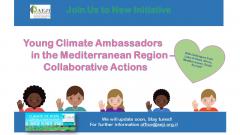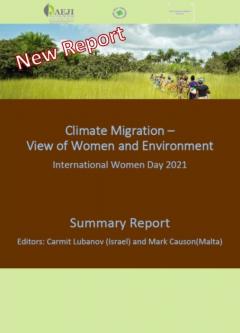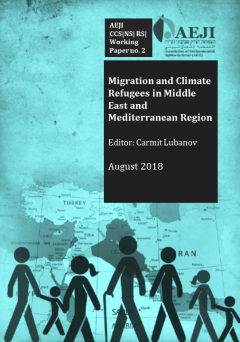Activity FieldsActivities of The Association of Environmental Justice in Israel
Climate Young Ambassadors in Mediterranean Region
New Initiative by AEJI
Carmit Lubanov, Association of Environmental Justice in Israel (AEJI)
| Friday, 02-Aug-2019
New Initiative of AEJI
"Climate Young Ambassadors in the Mediterranean".
Conceptualized and formulated by Carmit Lubanov, AEJI' executive director, 2019
aeji_climate_ambassadors_initiative_in_mediterranean_august2019.pdf
Young Climate Ambassadors in the Mediterranean by AEJI
Climate Migration – View of Women and Environment
Summary Report on the occasion of International Women Day 2021
Carmit Lubanov (Israel), Dr. Mark Causon(Malta)
| Thursday, 18-Mar-2021
Although "Climate migration" is the result of a double and ongoing crisis that has befallen the world in recent years - the climate change and the forced migration – this field has not researched widely and the international institutions not yet recognized for climate refugees.
The world is witnessing extreme climate events occur in different regions of the world - massive floods and severe droughts that claim human lives, forcing entire communities to abandon their place of residence and move to a safer place. Some, especially the young, are even abandoning their homeland and trying their luck to migrate to Western countries to ensure themselves and their families a more secure future. The Mediterranean has become a destination of migration routes from Africa, the near and far East, Afghanistan, Syria, Iraq and other countries characterized by wars, political persecution and civil rights violations, including women and children.
The northern Mediterranean countries today and to a limited extent the southern Mediterranean countries have in the last two decades become a destination for many migrant groups and serve as 'transit stations' for many of them on the way seeking for to a better safer future.
The field of climate migration by definition is multidisciplinary and requires cooperation between international institutions and countries, humanitarian organizations and police authorities, civil society organizations and governments to offer an outline of economic development and social integration of immigrants, forced migration, with forced absorption, sometimes without resources.
Anna Lind Foundation (ALF) recently awarded a research grant to a group we are among its initiators for "Climate Change and Migration in Euro-Med region: Socio-Economic Development and Intercultural Perspective" headed by the University of Calabria (Italy) and with the participation of Association for Environmental Justice (Israel), Genista Research Foundation (Malta), Università d'Annunzio Chieti-Pescara (Italy), FHIRD- Farhat Hached Institute for Research and Democracy (Tunisia) and IMDI - Institute Migration Development and Integration (Albania). This grant is aimed for initial research, in which we will hold a workshop at the end of May 2021.
For us, who initiated the event and are part of a group of researchers and heads of organizations dealing with both climate policy aspects in the Mediterranean, and the issue of migration absorption in the Mediterranean countries - it is clear that it is important to raise climate migration on the agenda, on the academic arena, in front of decision-makers at the state and international level and among activists for civil rights and social justice.
The event we held on March 8, to mark International Women's Day, aims to raise awareness of the issue of climatic migration, and to be part of constructing a new discourse on the subject that includes both the affected geographical regions, such as Lake Chad in the African continent, and the migration absorption regions in southern Europe, such Albania and Portugal - while focusing on Women population, which according to a BBC study constitutes 85% of global climate migrants.
AEJI – Climate Research and Policy Decades of Climate Research 2009 – 2020
| Monday, 15-Jun-2020
list_aeji_climate_policy_docs_and_events_2020.pdf
Decade of Climate Justice - 2009- 2020
Migration and Climate Refugees in the Middle East and Mediterranean Region
AEJI CCS |NS|RS Working Paper no. 2:
The Association of Environmental Justice in Israel (AEJI)
| Thursday, 16-Aug-2018
This working-paper is part of Association of Environmental Justice in Israel (AEJI) policy-research on climate change in regional scale, aims to develop discourse on climate migration on public arena, and to provide analysis as a base for policy making assessments of "Climate Change and Security“ in Israel and the Middle East in order that social and human rights considerations will be integral part of policy making process on national, regional and international levels.
The multi-linkages that are between climate change and national security, and between cross-borders environment and human rights are all analyzed and discussed vis-à-vis the current geopolitical landscape and associated transboundary challenges in the East Mediterranean region.
The 1st report titled “Mitigation of Climate Risk and Adaptation to Climate Security in Israel and the Middle East: Policy Measures toward Geopolitical Cooperation and Regional Transformation” [researcher Joel Gordon, supervisor Carmit Lubanov], was published last year framing the full spectrum of actual climate security threats and challenges. The study employs the Intergovernmental Panel on Climate Change (IPCC) framework of "Climate Mitigation and Adaptation" to assess prospects for climate-security in the region. The paper is based on preliminary findings correlate Israel’s potential role in climate-security politics to positive economic benefits. To our view, Climate Change Leadership (CCL) offers an alternative pathway for regional cooperation and geopolitical stability through the advance of Middle Eastern-Mediterranean Alliances (MEMA’s). Furthermore, we propose this vision aligns to a core strategic national masterplan - Leveraging for Geopolitical Cooperation and Regional Transformation – designed to strengthen Israel’s national commitment towards a Climate Compatible Future (CCF). In order to achieve this future, Israel with the neighboring countries and the Mediterranean climate community must to focusing on migratory pressures and climate refugees, to advance geopolitical cooperation and regional transformation in order to be able to challenges the Climate Migration.
The working-paper raises the key topics in five sections. The full research of AEJI on migration and climate refugees in the Middle East and Eastern Mediterranean region will be published in the coming year.
migration_and_climate_refugees_aeji_working_paper_no2_2018_final.pdf
Migration and Climate Refugees in Africa, Middle East and Mediterranean Region
Climate Resilience of Municipalities in Israel – Steps towards a Social Climate Policy
Lecture of Tamar Neugarten - Climate Policy Convention 2015 - 7th June 2015
Tamar Neugarten
| Sunday, 07-Jun-2015
climate_convention_2015-_social_aspects_of_climate_resilience_-_tamar_neugarten_english.pdf
Climate Resilience of Municipalities in Israel – Steps towards a Social Climate Policy




